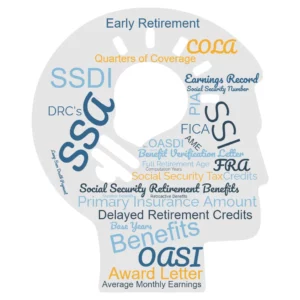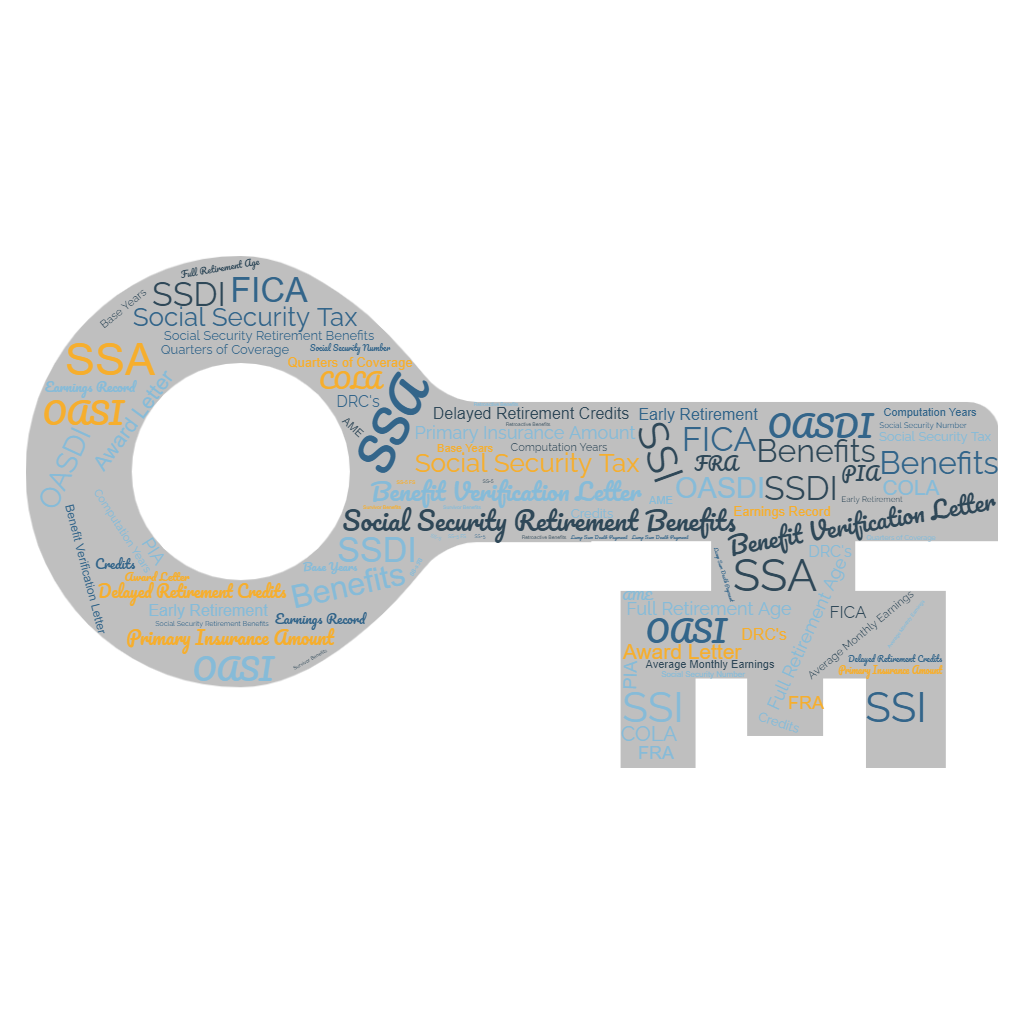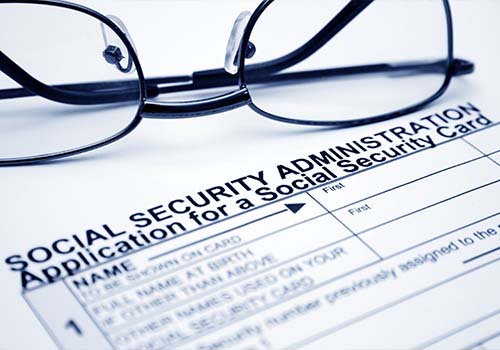Are you familiar with the lingo used by the govenerment to explain and describe Social Security benefits, or does it all seem to confusing? There are lots of Social Security acronyms and new technical terms used by the Social Security Administratation and if you aren’t familiar with them, it will be difficult to know what Social Security employees are talking about.
We strive to demistify the verbage used to describe various aspects of your Social Secruity benefits so that you are prepared when it comes time to apply for your Social Security benefits.

Understanding Social Security Lingo
We provide a simple summary of key Social Security terms and provide a list of Social Security acronyms and their definition.
General Social Security Acronyms and Technical Terms
SSA (Social Security Administration)
- SSA is the U.S. government agency that is responsible for oversight and execution of the Social Security programs.
SSI (Supplemental Security Income)
- SSI is a federal supplemental income program funded by general tax revenue (not Social Security taxes). It helps aged, blind, and disabled people who have limited income and resources by providing montly cash payments to meet basic needs for food, clothing, and shelter. See also What is SSI.
SSDI (Social Security Disability Insurance)
- SSDI is often shorted to just “DI” or disability insurance. The SSDI provides monthly payments to poeople who have a disability that stops or limites their ability to work.
FICA (Federal Insurance Contribution Act)
- FICA is the tax withheld from your wages that is used to fund the Social Security and Medicare programs.
OASDI (Old Age, Survivors, and Disability Insurance)
- OASDI is part of the FICA taxes that get deducted from your wages. These taxes are used to fund retirement benefits, survivor benefits and benefits from the disability insurance program. The OASDI tax is commonly referred to as the Social Security tax.
OASI (Old-Age and Survivors Insurance)
- The term OASDI covers all programs administered by the SSA, where as the term OASI referes to the specific SSA program that provides retirement and survivor benefits to qualified workers and their family members. It is synonymous with the more common term “Social Security Retirement Benefits.
Benefit Verfication Letter (Award Letter)
- An official letter from the SSA that states the amount an individual receives each month in Social Security benefits and/or SSI payments. See also Social Security Award Letter.
Benefits
- The SSA provides five types of benefits:
- Retirement
- Disability
- Spouse’s / Dependent Children
- Survivors
- Medicare
- The SSA provides five types of benefits:
Social Security Number
- Your nine-digit Social Security number is your first and continuous connection with the SSA. It helps the SSA identify and accurately record your covered wages or self-employment earnings. It is also used to monitor your record once you start getting benefits. Note: A Social Security number is important because you need it to get a job, collect Social Secuirty benefits, and get some other government services.
Acronyms and Terms Involving Your Benefit Amount
PIA (Primary Insurance Amount)
- PIA is the amount of money you will receive from the governement. See also calculating your retirement income.
FRA (Full Retirement Age)
- This is the desigated age for when you can apply and start receiving your “full” PIA. If you choose to start your retirement payments early, your monthly payment will be lower then the “full” amount. Subseqently, if you delay receiving your retirement, then you monthly payment will be higher then the “full” amount. See also when should I start taking retirement benefits.
Early Retirement
- You can elect to get Social Security retirement benefits as early as age 62 if you meet the eligibility requirements. However, the amount received will be less than the amount you would have recieved at FRA (Full Retirement Age). This is a permanent reduction in benefits, based on the number of months you recieved Early Retirement.
DRC’s (Delayed Retirement Credits)
- DRC’s are the incremental increases added to the PIA if you delay taking retirement benefits beyond your FRA. For example: If you wait to receive benefits until age 68 or even 70 your retirement benefits will increase by the delayed retirement credits. Note: The benefit increases stops after age 70, even if the person continues to delay taking benefits.
Credits (Quarters of Coverage)
- As you work and pay Social Security taxes, your earn credits (previously called “Quarters of Coverage”) thatcount towards your eligibility for future Social Security benefits. You can earn a maximum of four credits each year. Most people need 40 credits to qualify for benefits. Younger people need fewer credits to qualify ofr disability or survivors benefits.
Earnings Record
- Earnings Record is the chronological history of the amount of money you earned each year during your working lifetime. Your “credits” remian on your Soical Security earnings record even when you change jobs or have no earnings for a period of time. You can review your Earnings Record by registering for a mySocialSecurity account.
Base Years
- In initial computation, a wage earner’s base years for computing Social Security benefits are the years after 1950 up to the year before entitlement to retirement or disability insurance benefits. For a survivor’s claim, the base years include the year of the worker’s death.
Computation Years
- Computation years are the years with highest earnings taken from the base years. The SSA add total earnings for the compuation years and divide by the number of months in those years to get the AME (or the AIME). The SSA use your 35 highest years of earnings to compute your retirement benefits.
AME (Average Monthly Earnings)
- AME is the dollar amount used in calculating your monthly Social Security benefit if you attained age 62 or became disabled (or died) before 1978. See Retirement Benefits: How is it calculated?
COLA (Cost-of-Living Adjustment)
- COLA is the term used to decribe any potential increases you might receive to your monthly benefit amounts. COLA is calculated annually and is used as a means of trying to ensure your benefits keep up with increased living costs due to inflation.
Special Terms and Additional Social Security Benefits
Lump Sum Death Payment
- A one-time payment of $255 paid in addition to any monthly survivors benefits your family is eligible to receive. This amount is paid only to your widow/widower or minor children.
Survivor Benefits
- Benefits based on your individual record (when you die) that can be paid to your surviving heirs:
- Widow/Widower age 60 or older, 50 or older if disabled, or any age if caring for your childe who is under age 16, or who was diaabled before age 22.
- Children, if they are unmarried and under age 18, under 19 but still in school, or 18 or older but they were disabled before age 22.
- Parents, if you provided at least on-half of their support.
- Ex-Spouse, could also be eligible for a widow/widower’s benefit on your record.
- Benefits based on your individual record (when you die) that can be paid to your surviving heirs:
Retroactive Benefits (Back Pay)
- Monthly benefits (if you meet the requirements) that you may be entitled to receive, related to the time period before the month you actually applied for benefits.
Social Security Forms
Technical Terms for Social Security Forms
The Bottom Line
Knowing some of these terms can help you communicate more clearly about Social Security and can make your conversation with a Social Security employee more beneficial.
In addition, learning about the Social Security acronyms and technical terms can deepen your undersanding of how Social Security works for you.
Frequently Asked Questions
The best way to apply for Social Security is by completing the online application. If you cannot complete the application at once, you can save your application and complete it at a later time. The online application typically leads to the fastest processing, which means that your benefits will start sooner.
If you cannot submit an application online, you can also complete your application over the phone or in person.
If you are wondering when to apply for Social Security, you should give yourself a little time. In most cases, you can expect to start receiving your Social Security retirement benefits within three months of applying. If you fail to provide the required documents when requested, the process might take longer.
Disability benefits usually take longer than retirement benefits because many applications are initially denied. In some cases, it could take up to two years from the date of your application until you start receiving SSDI benefits.
The documentation that you need to bring along varies depending on what you are trying to do.
At a minimum, you will need some form of identification. This might be a driver’s license, U.S. passport, or state-issued non-driver’s identification card. You might also need your current Social Security card and even your birth certificate.
It is usually best to take everything you can, even if you are not sure whether you need it.
No, there is no charge to apply for Social Security. However, you should avoid applying if you know for sure that you do not qualify.
For example, if you have no work history and do not qualify for spousal benefits, then it would not make sense to apply for retirement benefits.
However, if you think that you might qualify, then go ahead and apply since there is no application fee.
You can find a Social Security office near you by using our SSA office locator and searching for your closest location.





